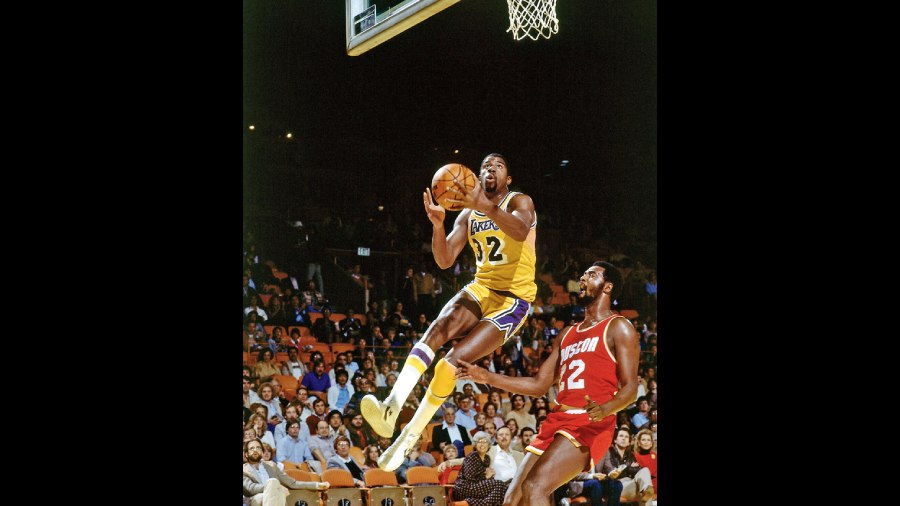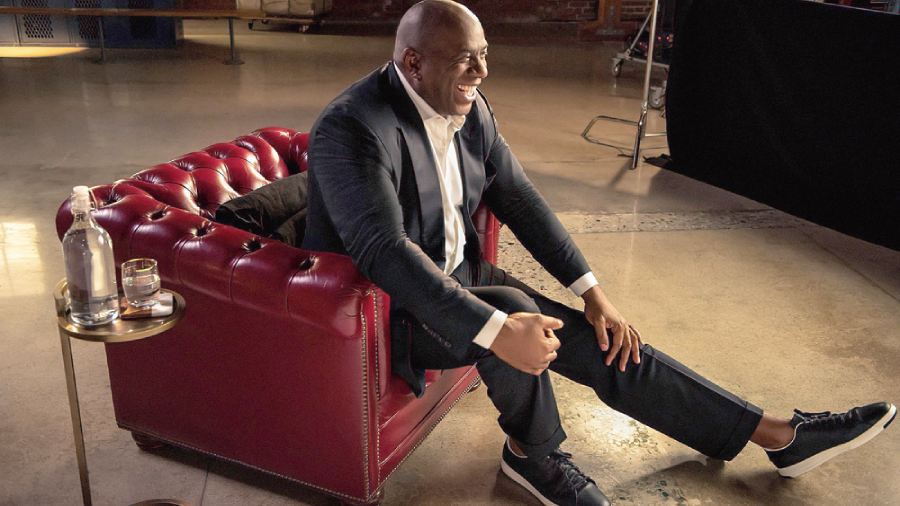Often we are told that athletes are role models though only a few rise to the occasion. Earvin “Magic” Johnson has been an exception; he has been an inspiration. In 1991, he showed the world why he was “Magic”. In a nationally televised conference, he told the world that he had been infected with the AIDS virus. No questions were ducked. Explanations were given. He retired from basketball only to return and retire twice more before calling it a day and turning all his attention towards a business career, and a very successful one at that.
It was about time the world had seen a proper documentary on the man and that’s exactly what we will be getting on April 22 when the four-part real-life story of Earvin “Magic” Johnson comes alive in They Call Me Magic on Apple TV+, offering a rare glimpse into his work and life — both on and off the court.
The Telegraph had an opportunity — as part of Television Critics Association (TCA) Winter Press Tour, on a virtual invitation from Apple TV+ — to hear the man discuss his life and why it is important to dream big.
Comparisons to The Last Dance (a 2020 miniseries around the career of Michael Jordan) are obviously going to be inevitable. Stylistically, what are the major differences between this series and that one?
It’s totally different because The Last Dance was all about basketball and Michael’s mindset and attitude towards winning. This is about my family. This is about me being a businessman. I have so many incredible people involved in terms of business partners. It’s a life journey, so you’ll see all phases of my life.
When did you realise it was the right time to do this documentary?
People had come to me before and wanted to do something but I felt the timing wasn’t right, and then I think what really happened was we were thinking about doing this… and then The Last Dance happened. Then everybody just said hey, “You gotta do yours.” I felt the timing was right. I was ready for it. I got a great partner in Apple and I think that this is an amazing journey that I’ve been on and we’re gonna tell that story. I’m very happy about this. It’s a good time.
What do you hope the docuseries will show other athletes and the general public?
I think it is about showing that athletes can reinvent themselves. And that you’re smart enough to play — football, basketball, soccer, baseball… it doesn’t matter — and remember all those plays and remember what your opponent is supposed to do. If you’re smart enough to remember all that… you can go to being a businessman or businesswoman. I really have the track record of success and now all those athletes have come and talked to me… Shaq (Shaquille O’Neal), Dwyane Wade… I can keep going. I tried to give them a blueprint; I had and have a blueprint and I just passed it on to them, so it’s all about what you want to see and do after your career. Do you want to see what happens after you retire?

I sit here and think about all the things I’ve been through. all the different doors that I walked through that were closed to a lot of African Americans, closed to a lot of athletes and for me to walk through those same doors… to open up access to African Americans… to open up access to minorities… to open up access to athletes… No way I could have dreamed of a situation like this
Will the Magic Hour (a talk show hosted by Magic Johnson that ran for a short time in 1998) be part of this documentary?
Yes, it will be. You know it’s a part of my journey. The Magic Hour didn’t turn out the way I wanted it to, but I was able to learn so much from failing. I want the highs and the lows to be in this documentary and everything was not great in my life. But at the same time, that’s what I want everybody to know: You’re gonna win and you’re gonna lose in life, it’s how you come back from when you fail is what’s important. I’ve always come back and I think that I’m happy that The Magic Hour is going to be in here. It will teach a lot of young people… that hey, you gonna have challenges, you’re gonna have things that happen that is not going to go your way. But you can pick yourself back up and try something else.
When you were a kid growing up, did you dare to dream this big? Where did that go?
I was always that guy who dreamed bigger than where I was at that time. But I couldn’t even imagine… I pinched myself all the time and it’s been an amazing journey. It even blows my mind and I sit here and think about all the things I’ve been through. All the different doors that I walked through that were closed to a lot of African Americans, closed to a lot of athletes and for me to walk through those same doors… to open up access to African Americans… to open up access to minorities… to open up access to athletes… no way I could have dreamed of a situation like this. Being on Apple TV+ with this docu will allow everybody to see this; follow my journey and my walk through life.
In your early days, who are the people you turned to?
First, I was blessed enough to know two guys who look like me and showed me that African Americans could actually own businesses and they were Greg Eaton and Joel Ferguson. Two businessmen who were Black like me in Lansing, Michigan. When I met them and saw that they owned all these businesses, I said, “Wow, I wanna be like them.” My dream went from ‘I want to make it to the NBA’ and then ‘I want to become a businessman’ and that’s what really jump-started my thinking about becoming a businessman after my basketball career.
And then once I got to the NBA, the Laker owner, the late, great Dr Jerry Buss, took me under his wing and really mentored me for the next chapter of my life, which was to become an entrepreneur. So I gotta give him a lot of credit first. And then Michael Ovitz, who started and co-founded CAA. He became a great mentor. I can keep going. There are so many great mentors that I had in my life. Peter Gruber, at the time he was running Sony (Pictures). When I think about all these people who have touched my life and mentored me and helped me to get started and then to two guys who really played in the NBA and who are Hall of Famers who own businesses after their career — Oscar Robertson, who had a track record of success and who probably paved the way for me, as well as a guy named Dave Bing… Dave had Bing Steel in Detroit and Oscar had a construction company in Cincinnati.
Was there ever a time when you doubted yourself?
No, I’m not a doubt-myself person. It’s not in my DNA. I’m solution driven. I meet challenges head on. I’m not a get-down-person on myself or allow my people who work for me to get down. It’s not what I’m all about. Even in negative situations, I try to find the good out of it and try to say, “Okay, hey I failed…”. Just like we were talking about during The Magic Hour… but there was some good that came out of that. That’s what I’ve always been about. I’ve always been the leader of my teams on the court, but also I was the guy who had lost games. I said: “Okay, we just gotta make sure we don’t lose the next one and find out the reason why we lost that game to make sure that it doesn’t happen the next time. God has blessed me to wake up, so that’s why I’m excited about this documentary.











